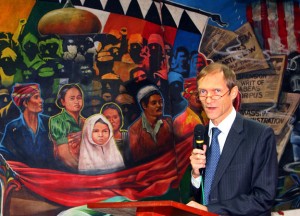MANILA, Philippines – The European Union is set to roll out new poverty alleviation programs this year in Mindanao in support of the peace negotiations between government and the Moro Islamic Liberation Front.
Guy Ledoux, ambassador of the EU in the Philippines, also expressed optimism about the progress of the talks following last year’s landmark signing of a preliminary framework agreement, paving the way for the creation of a Bangsamoro juridical entity.
“As far as I know, since the framework agreement was signed, there have been regular talks between the two peace panels in Kuala Lumpur on a monthly basis; I think they are making progress. We are fully confident that we are on the right track,” Ledoux said at a recent press briefing.
Ledoux said Mindanao would be a priority area in EU’s allocation of P2 billion in fresh assistance to the Philippines this year – aid that Europe sustains despite challenging times for European economies.
He said funding for Mindanao would continue supporting poverty alleviation programs in the region, initiated last year through some P300 million in grants funneled through the World Food Program.
“We have been very much involved in supporting the political process as well as providing assistance on the island. We aim for peace dividends for all the population and it (EU) is likely to put money in those types of projects,” Ledoux said.
Part of the fresh funds will also go to the Philippines’ health sector, particularly to programs of the Department of Health aimed at providing universal health care.
The EU is among the Philippines’ largest donors, second only to Japan with roughly P5.9 billion in aid disbursements in 2011, 90 percent of which consisted of “direct grants rather than loans.”
This was on top of bilateral aid provided by individual European countries, notably the United Kingdom, Spain, Italy, France and Germany.
Spain, for instance, also provides development aid to the southern Philippines, particularly for projects in northern Mindanao and the Zamboanga Peninsula, said Spanish Ambassador to the Philippines Jorge Domecq.
Germany also provided some P40 million in 2012 to for technical assistance on environmental protection, rural development, climate change mitigation and financial cooperation, said its Ambassador Joachim Heidorn.
The French government “expanded the scope and magnitude of aid” for the Philippines in 2010, recognizing the country’s importance in the Southeast Asian region, said French Ambassador Gilles Garachon.
French support focuses on exchanges between French and Filipino students and researchers and funding for the development of Philippine cinema.
